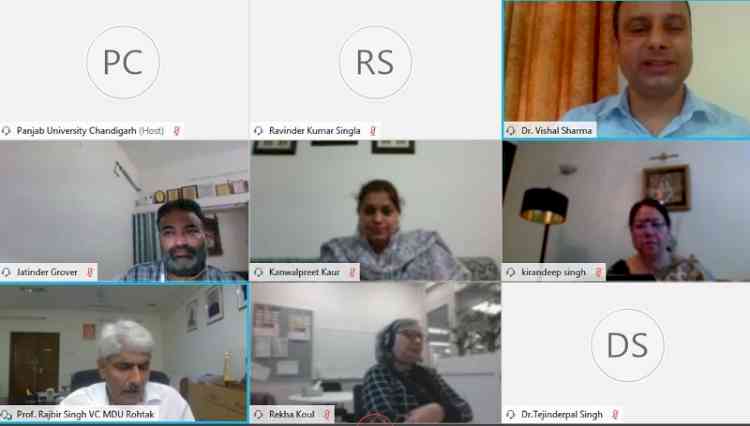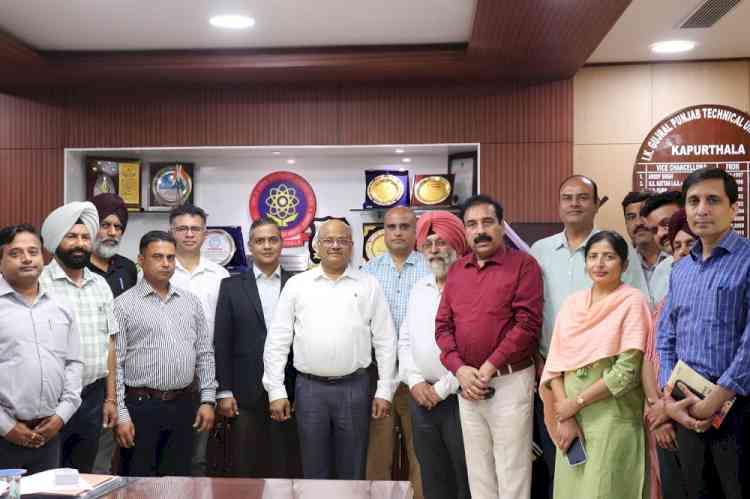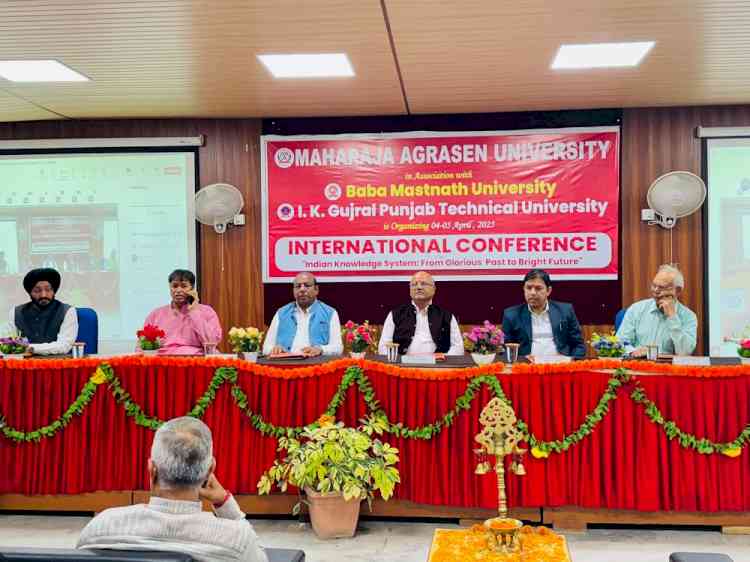7 Days FDP commenced at PU
The theme was “managing virtual classroom and open education resources”

Chandigarh: With the initiatives of Ministry of Human Resource and Development, under the aegis of Pandit Madan Mohan Malaviya National Mission on Teachers and Teaching, the Center for Academic Leadership and Education Management (CALEM) running in Panjab University Chandigarh has taken an initiative to arrange an Online seven days Faculty Development Programme from June 24-29, 2020 on the theme of "Managing Virtual Classroom and Open Education Resources".
More than 700 participants from 30 universities from India got registered for this workshop. More than 100 teachers of Panjab University, Chandigarh are also participating in this workshop. The course is coordinated by Dr Vishal Sharma (Coordinator, Swayam), Dr Kanwalpreet Kaur (Chairperson, IETVE), Dr Tejinderpal Singh, (UBS), Prof. Kirandeep Singh (Chairperson, Deptt. of Education); Prof. Jatinder Grover (Coordinator CALEM and Dean, Faculty of Education), Panjab University, Chandigarh.
Prof. R.K. Singla, Dean of University Instructions, Panjab University, Chandigarh welcomed all the dignitaries and participants. He shared that the main objective of this faculty development programme is to create awareness among faculty members about the Open Educational Resources and online teaching-learning tools. Learning of these tools and techniques will help the faculty members to design their own online courses as well as e-content for the virtual classroom teaching.
Prof. Rajbir Singh Ji, Honourable Vice-Chancellor, Maharishi Dayanand University, Rohtak inaugurated the workshop. He highlighted the need for training the teachers about using the technology tools to supplement and complement the learning. The status of the teacher cannot be compromised as teachers have to take the responsibility of development of students, society and country. He shared that plenty of material related to all subjects is available at ConsortiumforEducational Communication, aninter-university centre ofUniversityGrantsCommission(UGC) dedicated tothecauseofdigitaleducationinIndia. He endorsed that universities have to take the initiative to orient the teachers to plan teaching models through online mode.
Prof. Rekha Koul, Dean International, Curtin University, Perth, Australia delivered the keynote address. She shared that in the Indian education system there is a gap in theory and practice. Policy planners and teachers have to plan to narrow down this gap. She said that in India, not a single instructional model can work due to socio-cultural diversity. She elaborated on the relevance of constructivist pedagogy, blended learning, flipped classroom in the present scenario. She stressed that collaboration is the major 21st-century skill that every student has to learn for managing all stress and adjustment related issues in the work environment. Indian schools have to adopt new norms for evaluation like the norm- referenced testing, two or three-tier multiple-choice questions to have an in-depth analysis of the knowledge of students. For reliable and valid evaluation, rubrics for evaluation need to be developed. She highlighted the need to change the mindset of parents in India who are still asking about the rank of their kid in the class. Parents have to know the actual learning of their kids.
In the second session, Dr Amarendra Behera, Joint Director, CIET, NCERT, New Delhi elaborated upon the initiatives of Govt. of India related to online platforms. During the period of COVID-19, teachers have to learn about the synchronous or asynchronous mode of blending. Television and Radio networks have to be used to cater to the needs of students living in hilly and inaccessible areas.
In the third session, Prof. Srinivasa K.G., NITTTR, Chandigarh dwelled on the usage of Open Education Resources for developing e-content. He demonstrated the application of various open education resources for developing e-content.
Prof. Jatinder Grover, Coordinator CALEM shared that This current COVID-19 pandemic has changed our lifestyle and given us various new normal’s including in the field of education. In the current COVID-19 pandemic, there has been a rise in search on google on the themes "how to teach online", "best virtual learning platforms", "online teaching tools", and "open education resources" etc. Teachers who were not ready to use technology, now have to take the bull by its horns. Others who are efficient in using all these resources and platforms require some re-learning.


 cityairnews
cityairnews 







